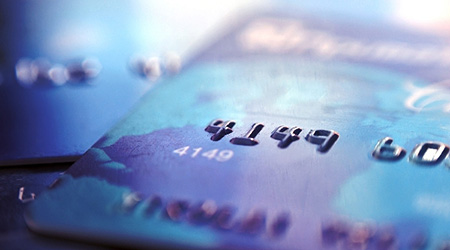Can My Wife Use My Credit Card In My Name?

Credit cards have made purchasing goods and services relatively easy since they were first introduced in the early 1900s. Their flexibility in payment and their availability by being accepted by thousands of merchants throughout the country has made them an invaluable tool for most consumers. While it is common practice for the person whose name is on the credit card to be the same individual making the purchase that is not always the case. Modern technology and the Internet has made the situation even more ambiguous and the legal implications could have an impact on the cardholder.
When credit cards were first introduced they were used by the elite as a means to consolidate payments when staying in a hotel or eating at restaurants. In the 1950s, Diners Club International issued a credit card for people who frequented restaurants but only wanted to pay one bill a month instead of paying every time they ate out. This ease-of-use model expanded in the 1960s when MasterCharge and American Express began offering lines of credit to more consumers incentivizing even more retailers to accept credit cards as payment. While initially created for the convenience, credit cards have become an indispensable tool used by millions of consumers to purchase groceries and put gas in their cars among other things.
By opening a credit card account, the legal obligation agreed to by terms in the contract are the responsibility of the account holder. As such they are technically the only one able to use a credit card which is in their name. There is some variation in credit card usage for joint accounts and businesses but generally speaking it's a one card one account holder rule. In some circumstances two individuals can be on a single credit card, which is not a joint account, because one has cosigned for the other which is often the case in parent teenager relationships.
When a husband or wife uses either ones credit card to make purchases there is normally not a problem and the transaction goes smoothly. Keep in mind that this is technically illegal and a retailer or business can flatly deny accepting the credit card as a form of payment if they so choose. This is because regardless of the relationship, from the retailers perspectives it is a possible fraudulent transaction and to accept payment could open them up to liability and a possible charge back. What happens in the case of a separation or revenge for infidelity that a spouse runs up thousands of dollars on a credit card where they are not the account holder? It happens more often than you might think.
One of the primary forms of security for businesses when excepting credit card payments is matching a signature from a drivers license to the signature on the credit card. Many retailers, especially in today's era of identity theft, will refuse to accept a credit card where the signatures do not match. Writing a note authorizing use of the credit card also doesn't work very well nowadays due to fraudulent transactions. One of the exceptions however is online or phone purchases were signatures cannot be compared. In these situations a spouse using their husband's or wife's credit card is much more likely to be successful because access to the credit card itself is normally all that is required to successfully complete a purchase.
So the answer to the question can my wife use my credit card in my name, which would obviously apply to husbands, is sometimes yes and sometimes no. It depends on the situation, like whether it's an Internet purchase or a retail establishment, and how thorough the business is at checking signatures to limit fraud. Legally speaking however only a credit card holder is able to make purchases on their credit card.
Elsewhere on StockMonkeys.com







